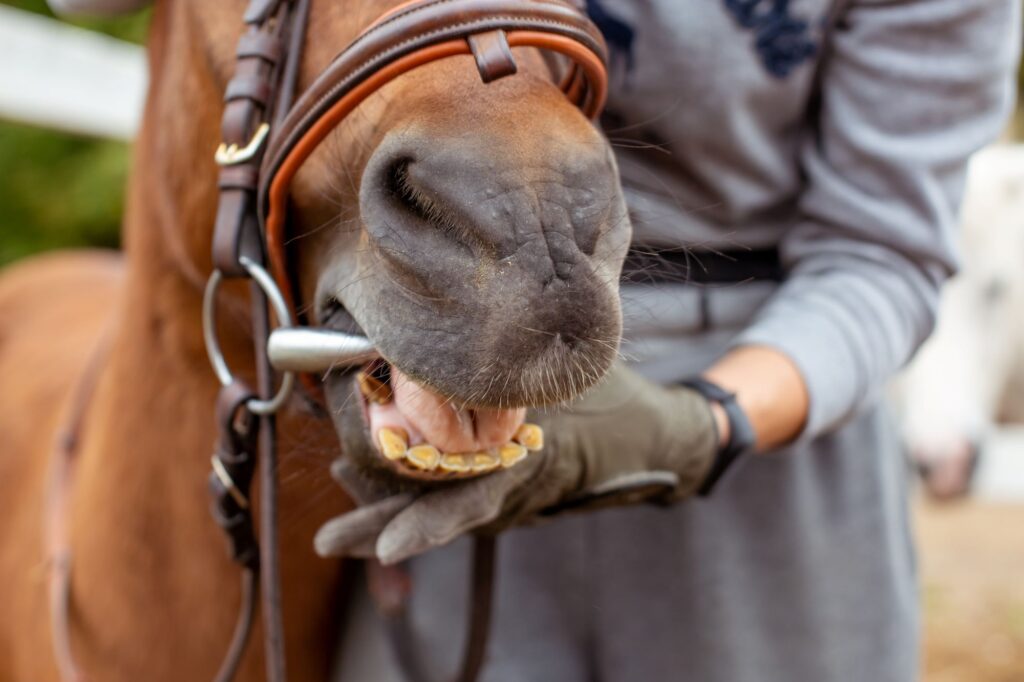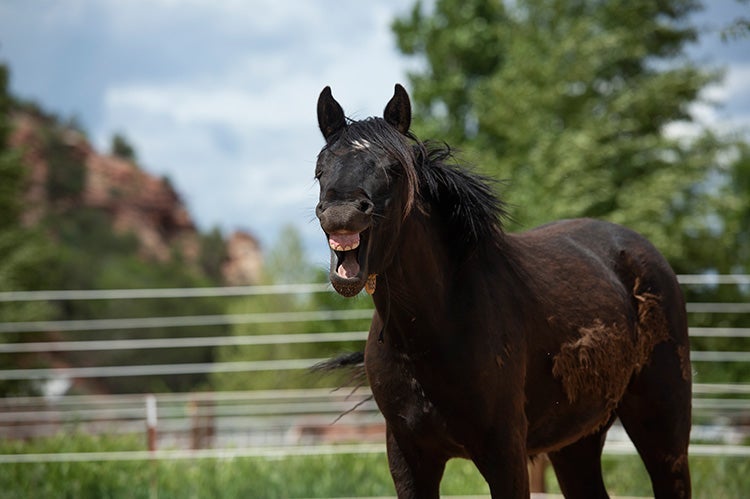The intricate relationship between horse teeth and digestion is crucial for the overall health and well-being of our equine companions. As any equestrian enthusiast will tell you, maintaining a horse’s dental health is not just about ensuring a bright smile, but it’s vital for their digestive health as well. Horses rely on their teeth to properly chew their food, which directly impacts their digestive system. Understanding this connection is essential for anyone involved in horse care.

The Anatomy of Horse Teeth
Just like humans, horses have a set of teeth that are adapted to their dietary needs. Horses are herbivores, and their teeth are designed to grind down fibrous plant material. Each type of tooth in a horse’s mouth has a specific function. The incisors, found at the front, are used to grasp and cut grass, while the molars, located at the back, grind the food into smaller particles for digestion.
Types of Horse Teeth
Horses have several types of teeth, each playing a role in digestion:
- Incisors: Used for cutting and grasping food.
- Canines: Usually found in male horses and sometimes called ‘tusks’.
- Premolars and Molars: Responsible for grinding the food.
The Process of Digestion in Horses
Once the food is sufficiently chewed, it moves down the esophagus into the stomach, where digestion begins. However, unlike ruminants such as cows, horses have a relatively small stomach and rely heavily on the hindgut fermentation process. This means that the food needs to be broken down into small particles in the mouth for effective digestion later in the gut.
Importance of Chewing
Proper chewing increases the surface area of the food particles, making it easier for digestive enzymes to break down the food. This is why dental health is so important for horses. If a horse cannot chew properly, it may lead to digestive issues, colic, or even weight loss.
Common Dental Problems in Horses
Dental problems can lead to significant issues with a horse’s digestion. Some of the most common problems include:
- Sharp Molars: These can cause pain and lead to improper chewing. Learn more about sharp molars.
- Oral Tumors: These can affect the horse’s ability to chew. For more information, visit oral tumors.
- Tooth Decay: This can lead to abscesses and infection.
Signs of Dental Issues
Recognizing the signs of dental problems early can prevent more serious health issues. Some signs include:
- Dropping food while eating (also known as ‘quidding’).
- Weight loss.
- Foul odor from the mouth.
- Reluctance to eat or drink.
Preventive Measures
Regular dental check-ups are crucial for maintaining a horse’s dental and digestive health. A comprehensive mouth exam checklist can help identify issues early on.
Routine Dental Care
Routine care includes regular floating, where sharp edges of the teeth are filed down, and checking for any signs of decay or other issues. It’s also important to ensure that the horse’s diet is balanced and provides all the necessary nutrients for maintaining strong teeth.
The Impact of Diet on Dental Health
A horse’s diet can significantly influence its dental health. Diets high in sugar or starch can lead to tooth decay, while a diet rich in fibrous material can help keep teeth healthy by providing a natural way to wear down teeth as they grow.
Nutritional Balance
Ensuring a balance of nutrients is crucial. For more details on equine nutrition and dentistry, refer to this equine dentistry resource.
The Role of Veterinary Care
Regular veterinary check-ups are essential to ensure that any dental issues are caught and treated early. A veterinarian can perform a thorough dental examination and provide treatment options if necessary. Before purchasing a horse, it’s advisable to have a dental exam conducted.

FAQs
How often should a horse have a dental check-up?
It’s recommended that horses have a dental check-up at least once a year, although some horses may need more frequent visits depending on their age and dental health.
What are the signs that my horse may have dental issues?
Signs of dental issues include difficulty eating, weight loss, and an unwillingness to be bridled. You can read more about behavior and tooth issues.
Can diet alone prevent dental problems in horses?
While a proper diet can help maintain dental health, it should be combined with regular veterinary care to prevent and address any issues.
Understanding the connection between horse teeth and digestion is essential for anyone involved in horse care. By ensuring that a horse’s dental health is maintained, we can help promote better digestion and overall health, allowing our equine companions to thrive.
This article contains affiliate links. We may earn a commission at no extra cost to you.
